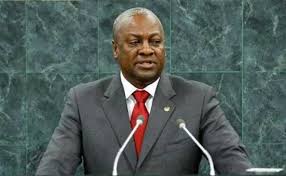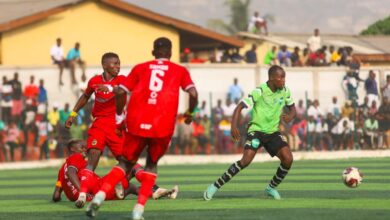
Your Excellency the Vice President,
Right Honourable Speaker,
Your Ladyship the Chief Justice
Honourable Members of Parliament
Mr. Speaker,
Allow me to begin by wishing everyone a Happy New Year. Afihyiapa.
This hall that exists within these walls is a place where I have always felt at home. It was in this august house, as an MP for Bole-Bamboi, that I began my political career. Or, better said, it was when I first held public office. The residents of that community entrusted me with the privilege of representing their best interests in the national dialogue of policymaking and legislation.
It seems fitting that I should find myself here in this same house delivering my final public address which will, in effect, bring to a close my tenure as President.
I deliver this message on the State of the Nation in fulfilment of Article 67 of the 1992 constitution.
It has been a rare honour and privilege for me to serve my country in the highest office as President. It has been a worthwhile journey. And let me seize the opportunity to thank God for his grace and to the good people of Ghana for the opportunity to serve.
May I also respectfully thank My Vice President, Mr. Speaker, Her Ladyship the Chief Justice and Honourable Members of this House for the cooperation and solidarity I have enjoyed during my tenure as President.
Mr. Speaker,
The purpose of this specific State of the Nation Address is to let the people of Ghana know where we stand as a country as the baton of leadership passed from one leader to another. Where are we in this race, so to speak. In so far as nation-building, how is Ghana faring when compared to other nations in Africa and of course, in the world?
Our world has become increasingly complex and unpredictable. Majority of economies around the world are sailing against strong headwinds. The world economic crisis and the slow-down in the growth of the Chinese economy has affected the growth of emerging markets and has resulted in a fall in world demand for commodities. As the United States of America (USA) makes a slow but steady recovery, the recent increase in the USA interest rates means more money is leaving emerging markets and being reinvested in America. Coupled with the fall in commodity prices on the international markets, this is causing an adverse economic outlook for lower middle income economies like ours.
Changing climate has made the world weather more unpredictable. In our part of the world deforestation, sea erosion and tidal waves, erratic rainfall, more severe harmattan are becoming the new normal. These are wreaking havoc on non-irrigated agriculture and power production from hydro sources.
The rise of insurgency and failed states in North Africa and the middle-east and religious fundamentalism have resulted in a rise of many terrorist cells that have created a deadly cocktail across the whole world and increasingly in Africa, stretching from the Sahel, through West Africa, Central Africa, East Africa all the way to the Horn of Africa. Our sub-region has not been spared and attacks as close as Burkina Faso and Cote D’Ivoire have brought the reality of possible terrorist attacks closer to our doorstep. This is the global context in which our country has had to survive and make progress
EDUCATION
Mr. Speaker,
At the start of our term in office and for many years prior, there have been national dissatisfaction at the declining standards of education at the basic and secondary levels. Lack of access to both basic and secondary education meant that many children were being left behind.
A shortage of professionally trained teachers, teacher absenteeism, shortage of core textbooks- resulting in a situation in which four (4) children shared one textbook-, dilapidated schools, lack of science laboratories and workshops, among others, manifested in declining results at the Basic Education Certificate Examinations (BECE) and West African Secondary School Certificate Examinations (WASSCE).
Our vision under my administration has been to turn this situation around and not only improve access to education but also the quality of education.
Mr. Speaker,
We are witnessing a significant improvement in our educational outcomes. More children than ever before in our history are having access to education at the basic and secondary levels. With the distribution of free text books, children have access to all the four textbooks and no longer have to share.
In excess of two thousand (2,000) dilapidated schools popularly referred to as “schools under trees” have been replaced. Teachers are more available and are more evenly distributed than in the past. Teacher absenteeism is down from 27% to below 9%. This has led to more engagement hours between teachers and students.
The construction and population of forty-seven (47) newly built Community Day Senior High Schools means more students are able to continue their education beyond the basic level instead of dropping out.
These investments we have made are yielding results and reflecting in the performance of our children. Performance at both the Basic Education Certificate Examinations (BECE) and the West African Secondary School Certificate Examinations (WASSCE) have seen remarkable improvement. The very last batch of BECE students recorded the highest number of students obtaining a raw score of above 500 marks in the history of the examination.
We are recording improved performance in many public schools in the WASSCE across the country. During the Best Schools Awards Ceremonies, many rural and public schools are outperforming some of the better known urban and private schools. Ghana has consistently, over the last three years, taken the three top spots in the WASCCE.
The progressively free secondary education programme, under which we have absorbed the major fees paid by day students, has this year been extended to cover one hundred and forty thousand (140,000) boarding students.
Mr. Speaker,
At the tertiary education level, the construction of additional public universities in the Brong Ahafo and Volta Regions have improved access to university education. The sod cutting for start of work on the University of Environment and Sustainable Development in the Eastern Region, the conversion of the polytechnics into technical universities, the creation of three autonomous universities out of the University for Development Studies (UDS) are all creating additional opportunities for students to pursue courses at the tertiary level.
HEALTH
Mr. Speaker,
In the area of healthcare, the situation was no different. Many Ghanaians were denied access to quality healthcare. Although in 2005, the Kufuor administration had commenced one of the most famous social intervention programmes in the health sector on a broader scale, after years of experimentation, the National Health Insurance Scheme (NHIS), utilization was low due to lack of access to health facilities. The sector was characterized by a severe shortage of trained health professionals.
Our vision over the period of my administration has been to provide improved health facilities and trained health workers in all nooks and crannies of the country. Construction of new regional hospitals in Bolgatanga, Wa and Accra is dramatically improving the health outcomes for tens of thousands of people. New district hospitals in districts across the country, including the recent ones for which I cut sod in Wheta, Somanya, Buipe, Tolon and Sawla have and will advance even further our policy of providing every district with a first class health facility.
Mr. Speaker,
New Polyclinics, health centers and CHPS compounds have also helped to bring quality healthcare to the doorsteps of our people. This development has resulted in a phenomenal expansion of utilization of the NHIS. Out-patient utilization for 2015 stood at twenty-nine million up from nine million in 2008.
Increased numbers of trained professional being churned out of our training institutions has solved the problem of lack of personnel to man our health facilities. Indeed, at the rate at which this category of personnel are being produced, Ghana may need to sign agreements with less endowed countries to officially deploy some of our health professionals to assist improve their health systems.
SOCIAL PROTECTION
Mr. Speaker,
As a lower middle income country, income disparities widen the gap between the rich and poor. To cushion the poor and vulnerable, many social protection programmes have been introduced in Ghana.
At the start of this administration, the number of people benefitting from these schemes were very few. Under the school feeding programme, less than five hundred thousand (500,000) children were being fed. Under the Livelihood Empowerment Against Poverty (LEAP) programme, less than sixty thousand (60,000) households were benefitting. Few children had access to books, school uniforms and school sandals.
Mr. Speaker,
Our effort under this administration has been to expand the coverage of these programmes to cover the majority of the poor and vulnerable population in Ghana. The school feeding programme is better managed today under the auspices of the Ministry of Gender, Children and Social protection and covers more than 1.5 million children. The LEAP programme is benefitting almost one hundred and fifty (150,000) households.
The percentage of the District Assembly Common Fund meant for persons with disability has been increased by 50%. School children in public schools are receiving all their core textbooks and exercise books. Tens of thousands of children have benefitted from the free school sandals and uniforms programme. The introduction of the Eban card also means that vulnerable ones among the elderly receive some privileges and protection.
WATER & SANITATION
Mr. Speaker,
One of the essentials of life for which social exclusion was evident was in access to clean drinking water. Many rural and urban communities were water starved. Statistics indicate that by the year 2008, 56% of rural people and 58% of urban dwellers had access to potable water. This meant that water borne diseases were a major affliction and created a heavy incidence of disease on our healthcare system.
The universal target is to achieve “water for all by the year 2025”. Our vision has been to achieve this target well in advance of the target date. We have under my administration continued to increase investment in the provision of clean drinking water for our people.
Provision of bore holes, small town water systems, and major urban water treatment projects have significantly increased access to clean drinking water.
Statistics at the end of 2015 show that in excess of 76% of both rural and urban residents have access to potable water. The Teshie desalination plant, the Kpong water expansion project and the ATMA project have expanded access to urban water supply in the capital, Accra.
The Wa water supply project, the 3Ks project covering Kumawu, Konongo and Kwahu are all projects guaranteeing sustainable water supply to our people. We estimate that under this administration, we have lifted more than seven million people out of water deprivation.
POWER
Mr. Speaker,
The early years of this government was characterized by a crippling power crisis. The shortage of power led to a very unpopular load management programme. This shortage of power hobbled the growth of the economy, and affected both business and residential customers. Many businesses had to resort to the use of generators to survive.
Mr. Speaker,
I stood on the floor of this very house and took full responsibility for the crisis and promised that I would do my utmost to fix the problem. It has taken a lot of hard work and effort. Fast tracking the deployment of emergency plants, and speeding up the completion of ongoing plants ensured that we added more than 800MW of power over an 18-month period. This increased generation, in addition to the Energy Sector Levy and ongoing works to restructure the legacy debt of the power utilities, has helped to stabilize the power situation.
With the expectation of more domestic gas from the Ten and Sankofa Fields, Ghana is entering into an era of energy self-sufficiency. Indeed, the warning signals have started sounding about the danger of over- capacity and excess redundancy in the power sector.
We have agreed to work with the World Bank to rationalize the addition of new plants and ensure that we achieve optimum utilization of existing capacity.
Mr. Speaker,
Access to power under my administration has continued to increase. Ghana has one of the highest access to electricity estimated to be above 80% currently. Additional pending electrification programmes like the China Water Company and the Hunan Energy projects will bring even more communities onto the national grid.
ECONOMY
Mr. Speaker
We inherited an economy that was running a high deficit, with increasing inflation and interest rates. It was also characterized by a rapidly depreciating currency. This unstable macro environment created an unfavourable investment environment for both indigenous and foreign capital. Our forum at Senchi was an attempt to forge a consensus for a homegrown fiscal consolidation programme. The Senchi outcome eventually became the basis for the IMF Extended Credit Facility (ECF) programme we are implementing.
The ECF programme has resulted in an improved macro environment which is seeing a steady decline in inflation and interest rates. A new public debt management strategy is also seeing a steady decline in Public sector debt, estimated to have dropped from nearly 72% to below 65%. The currency has also enjoyed relative stability, depreciating at just above 4% this year.
Mr. Speaker,
While the deficit target will be missed this year on account of inability to meet revenue targets, it is important for us to continue to pursue fiscal consolidation in the 3rd and final year of the programme. Multiple causes are responsible for our inability to meet the target. Reduced lifting from the Jubilee field on account of the turret bearing problems, non-realization of some expected non-tax revenue such as the sale of electro-magnetic spectrum, reduced cocoa export revenue and higher than expected election-related expenditures. In spite of the breach of the fiscal deficit target, expenditure was lower than programmed and thus the approved appropriation for 2016 was not exceeded.
Ghana’s economy is still the second largest in West Africa with a GDP of almost $39 billion. Ghana has also moved up thirteen (13) places in the ease of doing business index and is currently considered number one on the World Bank index.
ROAD AND TRANSPORT
Mr. Speaker,
There was widespread dissatisfaction with the road network in the country. Complaints covered poor state of urban roads, feeder roads and highways. Many hours sitting in traffic caused frustration and discomfort for urban commuters. Poor feeder roads and pothole-riddled highways increased maintenance cost for drivers and in-turn led to increased fares and transport charges for goods.
My tenure of office has seen some of the most massive investments in the road sector in the history of Ghana. My vision was to finish off road projects I inherited such as Achimota-Ofankor, Awoshie-Pokuase, Sofo line, Tetteh Quarshie- Adenta etc.
We also commenced and completed the Kwame Nkrumah Interchange, fast tracked the construction and opening of the Kasoa overhead bridge, completed the Airport hills/Burma Camp network of roads and completed the 37- El Wak-Trade fair road.
We have also invested more resources in continuing the Eastern corridor road project, asphalt overlay of roads in Regional and District capitals and massive investments in cocoa roads across the country have opened up our country significantly.
Many other projects are ongoing such as the Tema motorway roundabout decongestion project, and a new bridge from flower pot roundabout on the Spintex Road over the Accra- Tema motorway into East Legon. There are others ready to commence with financing arranged such as the Obetsebi Lamptey interchange, the Pokuase interchange, and Motorway expansion project among others.
Mr. Speaker,
The transport sector has also experienced marked improvement under this administration. Incentives such as reduction in cost of aviation fuel, improved airport infrastructure has seen a massive increase in both domestic and international travel. The Terminal 3 project at the Kotoka international Airport is progressing fast and would make Accra the most favoured aviation destination in West Africa.
Already, the completed rehabilitation of the arrival hall in terminal 2 has created better comfort for passengers using Accra’s airport. Kumasi and Tamale Airport expansion will also see increased passenger movements. Wa and Ho are advancing steadily and would be open to commercial travel soon.
Commencement of the Bus Rapid Transit with dedicated bus lanes, christened “Aayalolo” will create better comfort for urban commuters. Urban rail systems like the sekondi-Kojokrom-Takoradi line will ease the inconvenience of commuters in the twin city. The Tema-Akosombo line will soon start to maximixe the use of the Volta Lake Transport Company for moving cargo for land-locked Sahel countries, upriver to Buipe in the Northern Region.
Work on the expansion of our two maritime ports at Takoradi and Tema are ongoing and would lead to faster turn-around times for ships and larger throughput cargo volumes. Bulk cargo handling will also be more efficient.
GOVERNANCE
Mr. Speaker,
Our security forces were severely challenged when it came to logistics and equipment to fulfil their constitutional mandate. Today, I can report with pride that vehicles, APCs, riot control equipment, aircrafts, helicopters, fire tenders make up a few of the components of the investments we have made in our security services.
Vehicles for judges and completion of the court complex has created a better atmosphere for the dispensation of justice.
Implementation of the National Anti-Corruption Action Plan (NACAP) unanimously adopted by this house remains on track. I wish to commend the house for the passage of numerous legislation including the recent Public Financial Management Act, which strengthens our hands in the fight against corruption. I must however say that the public and Civil Society Organisations are disappointed in our inability to pass the Right to Information bill and are still hopeful that before this Parliament is dissolved a consensus can be found to pass this bill into law.
Mr. Speaker,
The achievements outlined in this statement are accomplishments that my government and I proudly claim. But the state of our nation, at any given time–where we are in the race- is the result of more than the visible gains made by one individual during his tenure.
Every President inherits the unfinished work of his predecessor. Every president benefits from the seeds planted by his predecessor, seeds that could not be sown during his predecessor’s tenure.
Indeed, I believe if politics could be described as a sport, the one it would most closely resemble is a relay. It is a sport that relies as much on individual achievement as it does on teamwork and cooperative effort. The true test of that competition is in the passing of the baton. So, too, with politics.
Mr. Speaker,
President Jerry John Rawlings started the structural transformation of this economy under the Economic Recovery Programme. This programme restored Ghana to a path of growth which he handed over to President John Agyekum Kufuor.
President Kufuor continued the economic adjustment programme and under the HIPC initiative achieved significant debt reduction. Implementing new social intervention programmes such as NHIS and LEAP, he passed it on to President John Evans Atta Mills. President Mills commenced the Eastern Corridor road project, University of Ghana Medical Centre, which I inaugurated yesterday, the Kotokoraba market, Cape Coast stadium and host of others which I inherited and completed.
My administration commenced the construction of new community day senior high schools, a policy of progressively free secondary education, construction of the eastern university, investments in many infrastructure projects that are ongoing and many others that will actually commence under President Nana Addo Dankwa Akufo-Addo.
I am assured by his firm statements that he will continue these projects as enjoined by our constitution. I wish him all success in this regard. As I have said many times already, regardless of whose tenure in which these visions come to fruition, its success belongs to Ghana. They belong to all of us.
Mr. Speaker,
Political opposition and differences of opinion are vital to the health and growth of a democracy. Political parties are formed when people of similar ideology come together to move their agenda forward in a way that best serves their country.
But the wellbeing of the nation and the will of the people must always come first. Partisanship for its own sake, in the end, is no better than dictatorship. If we look around the world, we can so clearly see the deep divide that blind partisanship is creating in nations with democracies far older than ours.
We can see, too, the divide that it is threatening to create in ours if we are not careful. Already, it has taken a toll on our morale and our sense of optimism. It has given way to a cynicism that is as dangerous to the incoming political party as it was to ours.
We cannot afford as a nation to wish or hope for the failure of any president and his or her government. Ensuring accountability is not the same as leveling insults or encouraging apathy. We have history as proof that we have been better and we have done better. And we will, we must, do better once again.
Mr. Speaker,
I first entered this house as MP for Bole Bamboi in January 1997. It was, perhaps not coincidentally, the same year that Nana Addo Dankwa Akufo-Addo entered as MP for Akyem Abuakwa. Taking breaks from the business of the house to grab something to eat at the snack bar, Nana Addo always stood at the end of the counter, his signature white handkerchief tucked into his sleeve. “Johnny” he would shout in greeting as he preferred to call me. Incidentally we both served three terms in this house, departing together in January 2009.
This is how long I have known the president-elect and worked with him. I have the utmost respect for him.
Given our history, especially that we have each had our turn on each side of a presidential election, it would seem only natural for us to be considered opponents- worthy opponents is the description generally used in the world of sports.
In fact, Mr. Speaker, we are all on the same team. We worked together when I served as Ranking member on the Committee of Foreign Affairs at a time Nana Addo was the Minister for Foreign Affairs and Regional Integration.
One of the issues on which we crossed swords was the murder of some Ghanaian youth in the Gambia. It is instructive that as I leave office and he takes my place, Gambia once again is a nation that is engaging international attention.
Mr. Speaker,
It is my assertion that the information I’ve provided is a snapshot of the current state of our nation.
As I have said before, I will allow history to be the judge of how I have served our nation, how well I have done my part in running my lap of the relay. What that verdict will ultimately be, I cannot say. I can only say that I have done my best, given my all and done so with the best intentions for my country, our country.
This is why I stand here today, Mr. Speaker, holding the baton of leadership prepared to pass it on with pride, goodwill and determination, to Nana Addo Dankwa Akufo-Addo and ask all Ghanaians to cheer him on as he runs his portion of this relay for Ghana.
Mr. Speaker,
I thank you. I thank the members of this house.
And I thank the citizens of Ghana.
May God bless you and may God continue to bless our beloved homeland, Ghana.
ahotoronline.com|Ghana



